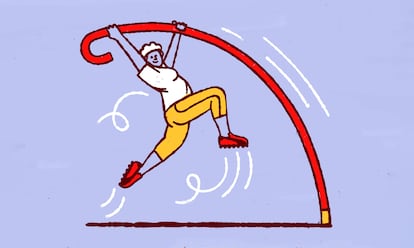Becoming an athlete to live past 100
Physical exercise is one of our main allies when it comes to slowing the aging process. According to Dr. Peter Attia, the key is to find activities that we can practice throughout our lives

President Kennedy used to say that the best time to repair a roof is when the sun is out. Similarly, we could say that the best time to worry about our hope and quality of life is when we are still healthy. Since the elixir of eternal youth does not exist and science has not yet managed to reverse the aging of our cells, we need to find a more realistic alternative that is within everyone’s reach. This involves becoming an athlete of life, as suggested by Peter Attia, MD, author of the book Outlive: The Science and Art of Longevity, which has become a bestseller in the United States. To do this, we need a change in attitude. In other words, we need to be proactive about understanding and approaching the aging process, rather than wait until we have become sick or been shocked by the loss of a loved one.
Preparing ourselves to become an athlete in life involves taking action to foster a longer life. Any one of us could face the “four horsemen,” which are the main causes of death and decline in our bodies: heart failure, cancer, neurodegenerative diseases and metabolic dysfunctions, and type 2 diabetes. If we know what encourages these diseases and take action now, we will be better prepared to minimize their impact.
This proactive strategy needs to be grounded in concrete tactics. We no doubt already know some of the best courses of action, such as physical exercise, a balanced diet, a good sleep routine, taking care of our emotional health and reviewing exogenous molecules, such as medications, hormones and supplements. Curiously, of all these tactics, the one that is best at addressing aging is physical exercise. Not only does it strengthen the heart and muscles, but it also improves blood circulation and our longevity. In fact, Dr. Attia provides very motivating data even for the most skeptical: going from zero minutes of physical exercise to an hour and a half a week can reduce the risk of dying from any of the “four horsemen” by 14%. In addition, sustained and regular exercise extends our life by an average of a decade, compared to a sedentary life.
Studies by Dr. Wendy Suzuki, a professor of neuroscience at New York University, show that physical activity is also good for the brain. Prolonged exercise over time strengthens our hippocampus and prefrontal cortex, which are great allies when it comes to preventing neurological diseases.
Increasing our longevity through physical exercise doesn’t mean taking up a high-action sport. What’s more, this proactive approach isn’t about cutting calories or looking to be more attractive. Rather, it means working on the three fundamental elements that protect us from the “four horsemen,” regardless of how old we are: endurance and aerobic efficiency, strength and stability. For example, in the case of resistance and aerobic efficiency, Attia suggests what doing he calls “Zone 2 training.” He describes this as one where if he was on the phone, he could hold the conversation for hours, but the person would be able to hear that he was exercising. In other words, aerobic activity that is moderate.
Likewise, when taking action, it is worthwhile focusing on activities that we would like to continue to do until we are over a century old. In other words, think about doing a decathlon made up of just the sports you like. José Luis Llorente, a former elite athlete and co-author of the book Vitamin X, suggests various activities adapted to personal tastes, from yoga and cross-country skiing to dance. In fact, an experiment conducted by German scientists showed that a six-months dance program had an impact had a greater impact on brain volume in areas related to higher cognitive processes than just exercise.
Lastly, it should be remembered that, although physical activity is the cornerstone to a long life, we cannot forget the other key elements: a nutrient-rich diet, getting proper sleep and knowing how to take care of our emotions are the basic ingredients for having a longer, healthier life.
Sign up for our weekly newsletter to get more English-language news coverage from EL PAÍS USA Edition
Tu suscripción se está usando en otro dispositivo
¿Quieres añadir otro usuario a tu suscripción?
Si continúas leyendo en este dispositivo, no se podrá leer en el otro.
FlechaTu suscripción se está usando en otro dispositivo y solo puedes acceder a EL PAÍS desde un dispositivo a la vez.
Si quieres compartir tu cuenta, cambia tu suscripción a la modalidad Premium, así podrás añadir otro usuario. Cada uno accederá con su propia cuenta de email, lo que os permitirá personalizar vuestra experiencia en EL PAÍS.
¿Tienes una suscripción de empresa? Accede aquí para contratar más cuentas.
En el caso de no saber quién está usando tu cuenta, te recomendamos cambiar tu contraseña aquí.
Si decides continuar compartiendo tu cuenta, este mensaje se mostrará en tu dispositivo y en el de la otra persona que está usando tu cuenta de forma indefinida, afectando a tu experiencia de lectura. Puedes consultar aquí los términos y condiciones de la suscripción digital.








































